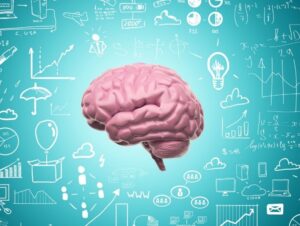Brain Facts
 The human brain is undoubtedly the most complex organ in our bodies. While an average adult brain is just 15 centimeters long, it contains hundreds of miles of blood vessels, billions of neurons, and consumes one fifth of the body’s energy. That’s brain power!
The human brain is undoubtedly the most complex organ in our bodies. While an average adult brain is just 15 centimeters long, it contains hundreds of miles of blood vessels, billions of neurons, and consumes one fifth of the body’s energy. That’s brain power!
- Your spinal cord carries messages from your brain to your body and vice versa.
- An adult brain weighs about 3 pounds.
- About 75 percent of the brain is made up of water. This means that dehydration, even in small amounts, can have a negative effect on the brain functions.
- The largest brain of any animal is that of the sperm whale. It weighs about 20 pounds.
- The human brain will grow three times its size in the first year of life. It continues to grow until you’re about 18 years old.
- Headaches are caused by a chemical reaction in your brain combined with the muscles and nerves of your neck and head.
- The brain of a human contains approximately one hundred billion neurons
- Information runs between neurons in your brain for everything we see, think, or do. These neurons move information at different speeds. The fastest speed for information to pass between neurons is about 250 mph.
- Dreams are believed to be a combination of imagination, phycological factors, and neurological factors. They prove that your brain is working even when you are sleeping.
- Phantom limb pain syndrome is when the central nervous system, which includes your brain, continues to feel the pain of a limb that has been amputated.
- The brain can’t feel pain. It interprets pain signals sent to it, but it does not feel pain.
- A brain freeze is really a sphenopalatine ganglioneuralgia. It happens when something you eat or drink something that’s cold. It chills the blood vessels and arteries in the very back of the throat, including the ones that take blood to your brain. These constrict when they’re cold and open back up with they’re warm again, causing the pain in your forehead.
- The human brain begins to lose some memory abilities as well as some cognitive skills by your late 20s.
- The human brain gets smaller as we get older. This usually happens sometime after middle age.
- Eyewitness accounts of criminal suspects is usually only about 50 percent accurate because it is difficult for your brain to remember the details of someone you’re not familiar with.
- Traumatic events can also affect the brains ability to remember details.
- Computer or video games may help improve cognitive abilities.
- Your brain uses 20 percent of the oxygen and blood in your body.




